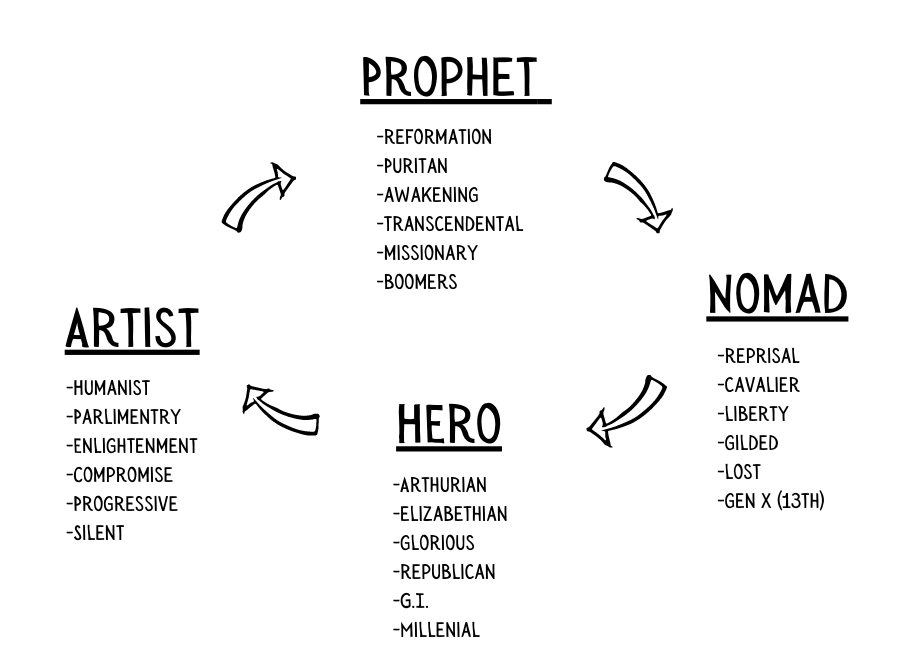 The fourth turning
The fourth turning

The Fourth Turning deals with history, political science, sociology, demography and philosophy. Its authors Neil Howe and William Strauss argue that history unfolds according to a precise and predictable cycle that they highlight in American history. It is a recurring generational cycle, the pattern of which can also be observed in other parts of the world, where it is becoming increasingly synchronised as a result of globalisation.
Each cycle lasts for a saeculum, which is 80-100 years or about the length of a lifetime. A saeculum consists of four seasons (“turnings”), each characterized by a profound change in national mood and culture. The sequence is as follows:
-
 High
High
-
 Awakening
Awakening
-
 Unravelling
Unravelling
-
 Crisis
Crisis

The 1st turning is a High, a post-crisis era where the prevailing optimism is associated with a high degree of conformism and trust in institutions. Individualism is in decline. The most recent High is the American high, after the Second World War.

The 2nd turning is an ‘awakening’, a period of spiritual upheaval in reaction to a contested value system. A sense of rebellion develops. The last awakening corresponds to the period of the “revolution of consciousness” (1964-1984).

The third turning sees the “unravelling” of society. Institutions are increasingly distrusted and individualism is on the rise.

The 4th turning is a ‘crisis’ that leads to the destruction of the old order and the emergence of a new order during the peak of the next saeculum.
The complex dynamics can be sumed up as follows:
This 4-turning cycle is accompanied by an inevitable succession of four generational archetypes. Each new generation is born during one of the four turnings whose events and moods shape the archetype. The ‘prophets‘ (these are the Boomers of the current saeculum) are born during a phase of High, the ‘nomads‘ (Generation X) during an Awakening, the ‘heroes‘ (Millenials) during an Unravelling and the artists (Generation Z) during a Crisis.

Howe and Strauss predicted in 1997 that we were approaching the 4th Turning : “Sometime before the year 2025, America will pass through a great portal of history, a passage similar in scope to the American Revolution, the Civil War, and the successive turmoil of the Great Depression and World War II.” This prediction has proven very accurate: since the global financial crisis of 2008, we have been living through the final act of a drama that began in the aftermath of World War II.

Individualism and collectivism are likely clash again, no longer for the control of the means of production but this time on a cultural ground.
At a fourth turning , the temptation of totalitarianism is strong. Such totalitarian impulses are already being expressed in geographies where they were thought to be extinct forever.
Bitcoin will undoubtedly be one of the main engines of a coming renaissance.
 More on the 4th turning
More on the 4th turning
The Fourth Turning: Why American 'Crisis' May Last Until 2030- Neil Howe
The above video is presented by Neil Howe, head of Hedgeye’s demography department. He describes the theory behind the book “The Fourth Turning”, he co-authored with William Strauss in 1997. Neil’s work has influenced politicians from Newt Gingrich to Al Gore, and it all adds up to one big theory in The Fourth Turning. According to Time magazine, President Donald Trump’s influential chief political strategist, Steve Bannon, was “captivated” by the book.
Bitcoin & the Rhythms of History - Brandon Quittem
 Megapolitics & individual sovereignty
Megapolitics & individual sovereignty
The Sovereign Individual

Published in 1997, The Sovereign Individual describes the advent of the Informational Age as the most significant economic and political transition in centuries. It is the latest iteration in a series of societal changes that have taken humanity from the time immemorial of hunting and gathering to the Agricultural and then the Industrial Age. The book examines the notions of individual property and the independence of the individual from the state in the context of the decline of nations and nation states.
The thesis of the book is based on the hypothesis of the fundamental role of the logic of violence. Throughout history, people have often found that it is easier to take from others than to produce themselves. Our hard work is lost if its fruits are not protected. In the course of history, the evolution of the means of protecting the fruits of our labour modifies the logic of violence. This evolution is at the heart of the main societal transformations.
The authors introduce the concept of megapolitical factors, explaining that in contrast with human institutions which remain under our conscious control, megapolitical factors are largely beyond our control. The four key types of megapolitical forces identified are: topography, climate, microbes, and technology. In the modern era, technology has proven to be by far the most important factor in determining the costs and rewards of power projection.
The shift to the information age with the advent of cryptography and the development of cyberspace will cause an irrevocable shift in the power of governments and liberate individuals as never before.
Davidson and Rees-Mogg note that societal transformations are accompanied by the questioning and replacement of moral standards. Authorities and institutions are treated with increasing disdain. The weakening of institutions and social ethics creates an environment for corruption.
The information age reduces the returns to violence and allows the rise of new sovereignties that can effectively protect against violence while consuming the least amount of resources. The central argument of this book is that the increased ability of individuals to protect their transactions and assets from predatory taxation implies a decline in the redistribution of resources, as well as less centralized social control, less regulation and enrolment, and ultimately a devolution of territory.
A 1997 Prophecy: The Sovereign Individual
 Investigating The Sovereign individual thesis further
Investigating The Sovereign individual thesis further
Bitcoin and The Sovereign Individual - James Davidson (co-author) with Robert Breedlove on the What is Money podcast
James Davidson joins Robert Breedlove to discuss themes from his book “The Sovereign Individual” that address megapolitical variables, shifting powers in the world and his predictions for the 21st century.









